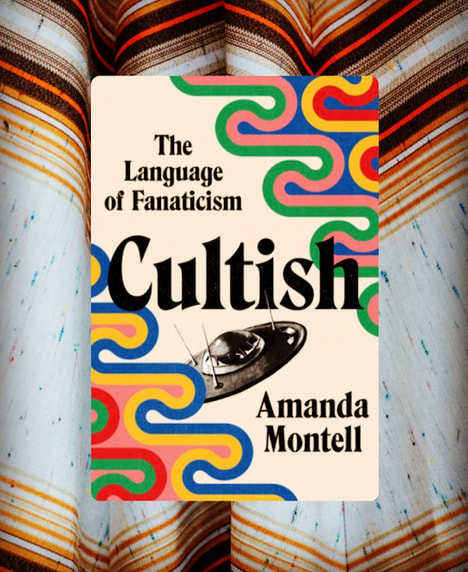|
This is the Cadillac of books for cult-obsessed readers. What makes this particular fresh-take so interesting is that Amanda Montell hones in on the linguistic similarities between groups that many people agree upon as cults and those groups that display “cultish” behavior but may not be thought of as actual cults in our society. She starts by examining some groups that are commonly labeled cults including Jim Jones and the Peoples Temple, Heaven’s Gate, and Scientology. She examines the commonalities that exist including leaders who function as “linguistic chameleons,” customizing word choice and style to influence whoever is in front of them. Most of these groups find ways to get followers to shed their old selves, submitting to this new collective. Heaven’s Gate followers were given new names with the suffix –ody to make them feel special and part of something unique. Scientology leaders co-opted terms from science and psychology to provide a sense of legitimacy to their claims. They also use an abundance of abbreviations for common words, creating a private language available only to followers. Montell then switches gears and begins examining other organizations that share similarly “cultish” language patterns. I’m fascinated by the section on multi-level-marketing companies (MLMs) because they’re so prominent in today’s social media world. This includes Amway, Mary Kay, LulaRoe, Arbonne, and so on. MLMs thrive on toxic positivity by continuing to peddle the dogma that hard work, blood, sweat, and tears will drive you to success while the MLM pyramid scheme parallels usually only benefit those on top. Just like cults, MLMs seek out people who are optimistic and hopeful and will continue gutting it out even when their savings account is dwindling away or their credit card bills are piling up. The forever-optimists will abide by the mantra, “if you’re not meeting goals, it’s because you need to work harder” and then attend that mega-convention where you’re expected to pay for your own flights, hotel, food, and merchandise. Even corporations like Amazon have shared cultish language. Montell wraps up by looking at the cultish behavior of fitness groups. From Peloton to Crossfit, there are leaders embroiled in controversy and characteristics that place these groups into the “cultish” category. The fitness coaches take on a worshipped god-like status where ritual brings followers into a shared community. People get hooked on the feeling of community. Sometimes the coaches at top levels are not even fitness experts, but are instead more successful in the down-line pyramid structure – scooping up new recruits who then also get new recruits under them and so on. And don’t worry, I see the amusing irony that I’m a cult fanatic reading about the language of fanatic cultish groups. Come, read this book - join us...
0 Comments
Leave a Reply. |
AuthorTravel All the Pages is inspired by my two loves - travel and reading, a combo I can't resist. Enjoy these little pairings. Archives
March 2023
Categories
All
|

